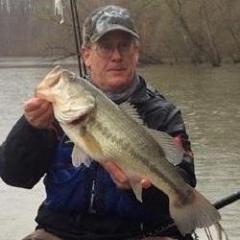Most of the time I go fishing with two identical baitcasting combos with monofilament line. 7' medium-heavy fast and Trilene XT 14-pound test monofilament. Part of it is because I fish from a kayak. I am not packing 15 rods. I also like to be able to lay my rods down on the front deck so that I can slide underneath overhanging branches (happens very frequently on the waters I fish).
What I lose in versatility I believe I gain in casting accuracy, making better presentations, hooking bass and landing bass. This approach is not for everybody but I know Rick Clunn used to employ a similar strategy on the water. See the short article below.
------------------------------------------------
If a tournament circuit told you that you could only fish one type of rod and one type of reel at its events, you'd think they were nuts. Well, what about Rick Clunn?
The man with arguably the greatest record ever in the sport of bass fishing uses just one rod and just one reel for 98 percent of his fishing: a Bass Pro Shops Rick Clunn 704 series heavy-action 7-foot rod, and a 6.3:1 Rick Clunn XPS signature reel. Why? Read on.
"If you look in my rod box you won't see a different rod and reel than those unless I'm fishing a spinning rod," Clunn says. "The reason is that it's a fallacy that you have to have different rods and reels to be a bass fisherman."
Best for Hooking and Landing
"The No. 1 rod for hooking and landing fish is a heavy-action, 7- foot, long-handled rod," he says. "You won't lose fish on that rod.
"If you want to mess around with lighter actions or medium-heavies, then fine. But accept that you will lose fish. That's not acceptable for me.
"I'm not changing because someone says you need to have a soft-tip rod to cast a (Norman) Tiny N. You don't -- it's a fallacy, especially when you sacrifice landing fish."
Rod History
Clunn fished glass (fiberglass) rods early in his career and favored them. But "it got harder and harder to get companies to provide with me with quality glass rods," he says.
When Bass Pro Shops approached him about a sponsorship, he asked the company to make him a composite rod with the type of action he liked. "I kept testing the rods, and the one rod I liked is the heavy-action rod.
"Anytime you go away from a heavy rod you will lose fish," he reiterates. "Most people want light-tip rods because they think it's better for casting and it wiggles better in the store. Heavier rods are like a cue stick in the store.
"But on the water, it will hook and land more fish any other rod."
High-Speed Reels
The matter of reel choice is simple: You can slow fast-retrieve-ratio (6.3:1) reels down, but "you can't speed up a slower reel without wearing yourself out," Clunn notes.
He also says that durability and castability are key factors in using one reel. "They have to be able to cast those big baits -- making 3-4 casts a minute with a big 3/4-ounce spinnerbait -- without breaking down."
Rhythm
Clunn's casting is "a matter of rhythm," he says. And "anytime you change to another rod with another reel you have to adjust. You'll sacrifice your accuracy because of that.
"The only thing I have to adjust to is the weight of the lure. That's how I get my accuracy: rhythm.
"It's like shooting a basketball. Once you're in that rhythm it's fine, but once you get out of it you're not. And changing your rod every 30 minutes or so is one of the major ways to get out of that rhythm."
History Behind It
"The best year I ever had in fishing was the first year I ever did this," Clunn says, referring to his great 2000 season. "I know it works.
"What winning translates into is execution, not losing fish. And I probably lost less fish that year than any other year in my career. And this year has been the same way.
"That's the bottom line," he says. "It's not the hype you give something. It's whether it works."
Not for Everyone?
Despite Clunn's conviction that the one rod, one reel method works for him, he says that it might not be right for everyone.
"If you're not losing any fish and you're happy with what you're doing, don't change," he says. Try his method "only if you're losing more fish than you think you should be, or if you're not happy with what you're doing.
"If that's not a problem, don't change."
------------------------------------------------------------








